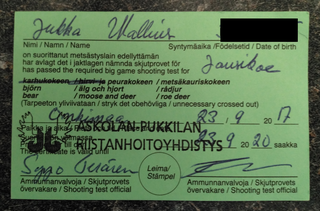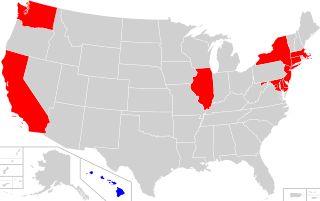Related Research Articles
Gun laws and policies, collectively referred to as firearms regulation or gun control, regulate the manufacture, sale, transfer, possession, modification, and use of small arms by civilians. Laws of some countries may afford civilians a right to keep and bear arms, and have more liberal gun laws than neighboring jurisdictions. Gun control typically restricts access to certain categories of firearms and limits the categories of persons who may be granted permission to access firearms. There may be separate licenses for hunting, sport shooting, self-defense, collecting, and concealed carry, each with different sets of requirements, privileges, and responsibilities.

The Gun Control Act of 1968 is a U.S. federal law that regulates the firearms industry and firearms ownership. Due to constitutional limitations, the Act is primarily based on regulating interstate commerce in firearms by generally prohibiting interstate firearms transfers except by manufacturers, dealers and importers licensed under a scheme set up under the Act.

Gun politics in the United States is characterized by two primary opposing ideologies regarding private firearm ownership.
Gun laws in the United States regulate the sale, possession, and use of firearms and ammunition. State laws vary considerably, and are independent of existing federal firearms laws, although they are sometimes broader or more limited in scope than the federal laws.
Indoor and outdoor shooting ranges exist throughout the United States. Tourist destinations in gun-friendly U.S. states often have rental ranges catering to domestic and international tourists.
The American Hunters and Shooters Association (AHSA) was a United States–based non-profit 501(c)(4) organization which operated from 2005 to 2010. The group described itself as a national grassroots organization for responsible gun ownership and advocated for increased gun control. The organization's president, Ray Schoenke, said the AHSA was intended to bridge the gap between urban liberals and rural gun owners, but closed down due to a lack of support from the Obama administration.

The Rocky Mountain Elk Foundation (RMEF) is a conservation and pro-hunting organization, founded in the United States in 1984 by four hunters from Troy, Montana. Its mission is to ensure the future of elk, other wildlife, their habitat and American hunting heritage. In support of this mission the RMEF is committed to:
- Conserving, restoring, and enhancing natural habitats;
- Promoting the sound management of wild, free-ranging elk, which may be hunted or otherwise enjoyed;
- Fostering cooperation among federal, state, tribal, and private organizations and individuals in wildlife management and habitat conservation; and
- Educating members and the public about habitat conservation, the value of hunting, hunting ethics, and wildlife management.

A hunting license or hunting permit is a regulatory or legal mechanism to control hunting, both commercial and recreational. A license specifically made for recreational hunting is sometimes called a game license.
The Federal Aid in Wildlife Restoration Act of 1937, most often referred to as the Pittman–Robertson Act for its sponsors, Nevada Senator Key Pittman and Virginia Congressman Absalom Willis Robertson, is an act that imposes an 11% tax on firearms, ammunition, and archery equipment and distributes the proceeds to state governments for wildlife projects.

The Permanent Electronic Duck Stamp Act of 2013 is a bill that was passed during the 113th United States Congress. The bill authorizes the United States Department of the Interior to issue electronic duck stamps as a form of Federal Duck Stamps.
Australia has a population of about 26 million while the Commonwealth Government estimating there are 640,000 recreational hunters in the country. There are around 6 million legally owned guns in Australia, ranging from airguns to single-shot, bolt-action, pump-action, lever-action or semi-automatic firearms.

The Sportsmen’s Heritage And Recreational Enhancement Act of 2013 is an omnibus bill that covers several firearms, fishing, hunting, and federal land laws. H.R. 3590 would establish or amend certain laws related to the use of firearms and other recreational activities on federal lands. The bill also would authorize the U.S. Fish and Wildlife Service (USFWS) to permanently allow any state to provide hunting and conservation stamps for migratory birds. In addition, the bill would require the Secretaries of the Interior and Agriculture to charge an annual permit fee for small crews that conduct commercial filming activities on certain federal lands. Finally, the bill would require the Secretary of the Interior to issue permits to certain hunters seeking to import polar bear remains from Canada.

Assault weapons legislation in the United States refers to bills and laws that define and restrict or make illegal the manufacture, transfer, and possession of assault weapons. How these firearms are defined and regulated varies from jurisdiction to jurisdiction; generally, this constitutes a list of specific firearms and combinations of features on semiautomatic firearms.

A high-capacity magazine ban is a law which bans or otherwise restricts detachable firearm magazines that can hold more than a certain number of rounds of ammunition. For example, in the United States, the now-expired Federal Assault Weapons Ban of 1994 included limits regarding magazines that could hold more than ten rounds. As of 2022, twelve U.S. states, and a number of local governments, ban or regulate magazines that they have legally defined as high-capacity. The majority of states do not ban or regulate any magazines on the basis of capacity. States that do have large capacity magazine bans or restrictions typically do not apply to firearms with fixed magazines whose capacity would otherwise exceed the large capacity threshold.

A sporting camp is an establishment that provides lodging, meals and guide service for hunting, fishing, and outdoor recreation and usually consists of a set of “camps” or cabins accompanied by a main lodge. Some also offer primitive outpost cabins. Traditionally found in forests and on lakes in remote locations throughout the state of Maine, sporting camps are a popular lodging destination that have offered a unique outdoors experience to sportsmen across New England and throughout the United States for over a century.

The Bipartisan Sportsmen's Act of 2014 is a bill related to hunting, fishing, and outdoor recreation in the United States.

Maine Question 1 (MQ1), "An Act To Prohibit the Use of Dogs, Bait or Traps When Hunting Bears Except under Certain Circumstances", was a citizen-initiated referendum measure in Maine, which was voted on in the general election of November 4, 2014. As the Maine Legislature declined to act on the proposed statute, it was automatically placed on the ballot. The proposal was defeated by 320,873 "No" votes to 279,617 "Yes".
Fair chase is a term used by hunters to describe an ethical approach to hunting big game animals. North America's oldest wildlife conservation group, the Boone and Crockett Club, defines "fair chase" as requiring the targeted game animal to be wild and free-ranging. "Wild" refers to an animal that is naturally bred and lives freely in nature. "Free-ranging" means an animal that is not restrained by traps or artificial barriers, so it has a fair chance of successfully escaping from the hunt.

Maine Question 3, formally An Act to Require Background Checks for Gun Sales, was a citizen-initiated referendum question that appeared on the Maine November 8, 2016 statewide ballot. It sought to require a background check for virtually all gun transfers in Maine, with some exceptions. As the Maine Legislature and Governor Paul LePage declined to enact the proposal as written, it appeared on the ballot along with elections for President of the United States, Maine's two United States House seats, the Maine Legislature, other statewide ballot questions, and various local elections.
Duck hunting is an outdoor recreational activity practised under a permit system in the Australian state of South Australia. Hunters use shotguns and are provided with permits issued by the Department of Environment and Water. The activity is opposed by animal welfare groups who consider the practice to be unacceptably cruel.
References
- ↑ "Fighting the 'antis' keeps watchdog group quite busy". Chicago Tribune. 2007-03-20. Retrieved 2009-01-01.
- ↑ "In Maine, a Public Park in Search of Public Support". The New York Times. 7 November 2006. Retrieved 19 November 2014.
- ↑ "Bear Hunt Controversy Shines the Spotlight on New Jersey's Wildlife Law" (PDF). August 2005. Retrieved 19 November 2014.
- ↑ "FindLaw's Supreme Court of New Jersey case and opinions". Findlaw.
- ↑ "Critical Federal Hunting and Fishing Bill Passes U.S. House of Representatives". U.S. Sportsmen's Alliance. 3 February 2014. Retrieved 6 February 2014.
- ↑ Kasperowicz, Pete (4 February 2014). "Tuesday: Firearms in the House, farm bill in the Senate". The Hill. Retrieved 6 February 2014.
- ↑ "H.R. 3590 - All Actions". United States Congress. Retrieved 6 February 2014.
- 1 2 "ussaprograms". The U.S. Sportsmen's Alliance. Retrieved 19 November 2014.